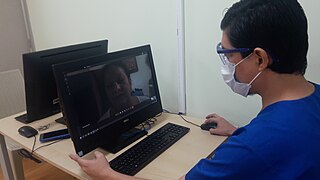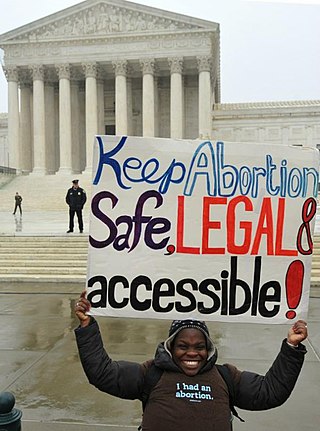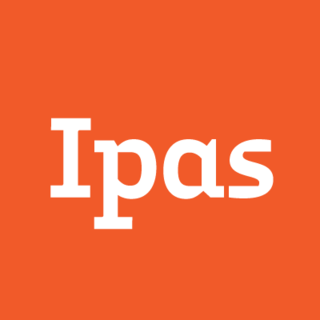Related Research Articles
Abortion in Australia is legal. There are no federal abortion laws, and full decriminalisation of the procedure has been enacted in all jurisdictions. Access to abortion varies between the states and territories: Surgical abortions are readily available on request within the first 22 to 24 weeks of pregnancy in most jurisdictions, and up to 16 weeks in Tasmania. Later-term abortions can be obtained with the approval of two doctors, although the Australian Capital Territory only requires a single physician's approval.

Telehealth is the distribution of health-related services and information via electronic information and telecommunication technologies. It allows long-distance patient and clinician contact, care, advice, reminders, education, intervention, monitoring, and remote admissions. Telemedicine is sometimes used as a synonym, or is used in a more limited sense to describe remote clinical services, such as diagnosis and monitoring. When rural settings, lack of transport, a lack of mobility, conditions due to outbreaks, epidemics or pandemics, decreased funding, or a lack of staff restrict access to care, telehealth may bridge the gap as well as provide distance-learning; meetings, supervision, and presentations between practitioners; online information and health data management and healthcare system integration. Telehealth could include two clinicians discussing a case over video conference; a robotic surgery occurring through remote access; physical therapy done via digital monitoring instruments, live feed and application combinations; tests being forwarded between facilities for interpretation by a higher specialist; home monitoring through continuous sending of patient health data; client to practitioner online conference; or even videophone interpretation during a consult.

A self-induced abortion is an abortion performed by the pregnant woman herself, or with the help of other, non-medical assistance. Although the term includes abortions induced outside of a clinical setting with legal, sometimes over-the-counter medication, it also refers to efforts to terminate a pregnancy through alternative, potentially more dangerous methods. Such practices may present a threat to the health of women.

Sexual and reproductive health (SRH) is a field of research, health care, and social activism that explores the health of an individual's reproductive system and sexual well-being during all stages of their life. Sexual and reproductive health is more commonly defined as sexual and reproductive health and rights, to encompass individual agency to make choices about their sexual and reproductive lives.
Home automation for the elderly and disabled focuses on making it possible for older adults and people with disabilities to remain at home, safe and comfortable. Home automation is becoming a viable option for older adults and people with disabilities who would prefer to stay in the comfort of their homes rather than move to a healthcare facility. This field uses much of the same technology and equipment as home automation for security, entertainment, and energy conservation but tailors it towards old people and people with disabilities.

Reproductive justice is a critical feminist framework that was invented as a response to United States reproductive politics. The three core values of reproductive justice are the right to have a child, the right to not have a child, and the right to parent a child or children in safe and healthy environments. The framework moves women's reproductive rights past a legal and political debate to incorporate the economic, social, and health factors that impact women's reproductive choices and decision-making ability.
Abortion has been legal in India under various circumstances with the introduction of the Medical Termination of Pregnancy (MTP) Act, 1971. The Medical Termination of Pregnancy Regulations, 2003 were issued under the Act to enable women to access safe and legal abortion services.
Connected health is a socio-technical model for healthcare management and delivery by using technology to provide healthcare services remotely. Connected health, also known as technology enabled care (TEC) aims to maximize healthcare resources and provide increased, flexible opportunities for consumers to engage with clinicians and better self-manage their care. It uses readily available consumer technologies to deliver patient care outside of the hospital or doctor's office. Connected health encompasses programs in telehealth, remote care and disease and lifestyle management, often leverages existing technologies such as connected devices using cellular networks and is associated with efforts to improve chronic care. However, there is an increasing blur between software capabilities and healthcare needs whereby technologists are now providing the solutions to support consumer wellness and provide the connectivity between patient data, information and decisions. This calls for new techniques to guide Connected Health solutions such as "design thinking" to support software developers in clearly identifying healthcare requirements, and extend and enrich traditional software requirements gathering techniques.

Ipas is an international, non-governmental organization that seeks to increase access to safe abortions and contraception. To this end the organization informs women how to obtain safe and legal abortions and trains relevant partners in Africa, Asia, and Latin America on how to provide and advocate for these.

Remote patient monitoring (RPM) is a technology to enable monitoring of patients outside of conventional clinical settings, such as in the home or in a remote area, which may increase access to care and decrease healthcare delivery costs. RPM involves the constant remote care of patients by their physicians, often to track physical symptoms, chronic conditions, or post-hospitalization rehab.
Abortion is the termination of human pregnancy, often performed in the first 28 weeks of pregnancy. In 1973, the United States Supreme Court in Roe v. Wade recognized a constitutional right to obtain an abortion without excessive government restriction, and in 1992 the Court in Planned Parenthood v. Casey invalidated restrictions that create an undue burden on people seeking abortions. Since then, there has continued to be an abortion debate in the United States, and some states have passed laws in the form of regulation of abortions but which have the purpose or effect of restricting its provision. The proponents of such laws argue they do not create an undue burden. Some state laws that impact the availability of abortions have been upheld by courts. In 2022, Roe and Casey were overturned by the Supreme Court in Dobbs v. Jackson Women's Health Organization, meaning that states may now regulate abortion in ways that were not previously permitted.
A medical abortion, also known as medication abortion or non-surgical abortion, occurs when drugs (medication) are used to bring about an abortion. Medical abortions are an alternative to surgical abortions such as vacuum aspiration or dilation and curettage. Medical abortions are more common than surgical abortions in most places around the world.
Abortion in Uganda is illegal unless performed by a licensed medical doctor in a situation where the woman's life is deemed to be at risk.
Abortion in Cambodia is legal upon request within the first twelve weeks of pregnancy.
Abortion is a controversial topic in Nigeria. Abortion in Nigeria is governed by two laws that differ depending on geographical location. Northern Nigeria is governed by The Penal Code and Southern Nigeria is governed by The Criminal Code. The only legal way to have an abortion in Nigeria is if having the child is going to put the mother's life in danger. However, sex-selective abortion has long had acceptance in Nigeria.

Carafem is an American nonprofit organization that provides women’s reproductive health services with centers in Maryland, Atlanta Georgia, Chicago Illinois, and Nashville TN metro areas as well as virtual care in select states. The organization seeks to normalize, "de-medicalize" and remove the social stigma from the provision of birth control and early abortions in the midst of an ongoing polarized and politicized debate on abortion in the United States. The organization intentionally uses certain language such as “health center” instead of “clinic”, and openly uses the word “abortion” in its advertising.

Aid Access is a nonprofit organization that provides access to medication abortion by mail to the United States and worldwide. It describes its work as a harm reduction strategy designed to provide safe access to mifepristone and misoprostol for those able to become pregnant in the United States who may not otherwise have access to abortion or miscarriage management services. People are able to manage their own abortion with remote access to a physician and a help-desk for any questions. The website is available in English, Spanish, and Dutch.
Plan C is a non-profit organization and campaign that provides educational resources and information to increase access to medication abortion in the United States. It was founded in 2015 by Francine Coeytaux, Elisa Wells, and Amy Merrill as a project under the fiscal sponsorship of the National Women's Health Network.

Maternity care deserts in the United States, also known as maternal care deserts, are counties that lack maternity care resources. The March of Dimes defines a maternity care desert as a county that has no hospitals or birth centers offering obstetric care and no obstetric providers. As of 2020 March of Dimes classified 1095 of 3139 of U.S. counties (34.9%) as maternity care deserts. Its 2022 report indicated an increase of nearly 2%, with 1119 of 3142 US counties (35.6%) considered maternity care deserts, affecting a population of over 5.6 million women. People living in maternity care deserts may have to travel longer distances to receive care, which is associated with higher costs and a greater risk of pregnancy complications.
Since the US Supreme Court overturned Roe v. Wade in June 2022, several states have enacted abortion shield laws to protect abortion access. The goal of these laws is to ensure that providers can perform abortions for patients who traveled from states where abortion is illegal; and also to protect telehealth actions, when the provider prescribes abortion pills to a patient while the patient is within an antiabortion state.
References
- Carrie N. Baker; "History and Politics of Medication Abortion in the United States and the Rise of Telemedicine and Self-Managed Abortion". J Health Polit Policy Law 1 August 2023; 48 (4): 485–510. doi: https://doi.org/10.1215/03616878-10449941
- Jenkins, J., Woodside, F., Lipinsky, K., Simmonds, K. and Coplon, L. (2021), "Abortion With Pills: Review of Current Options in The United States". Journal of Midwifery & Women's Health, 66: 749–757. https://doi.org/10.1111/jmwh.13291
- Howard S, Krishna G. "How the US scrapping of Roe v Wade threatens the global medical abortion revolution" BMJ 2022; 379 :o2349 doi:10.1136/bmj.o2349
- "Insurers Are Starting to Cover Telehealth Abortion" Claire Cain Miller, Margot Sanger-Katz April 18, 2023 New York Times https://www.nytimes.com/2023/04/18/upshot/abortion-pills-telehealth-insurance.html
- A Texas Republican Wants to Ban People From Reading About How to Get an Abortion Online" Bess Levin March 1, 2023 Vanity Fair https://www.vanityfair.com/news/2023/03/texas-abortion-websites-ban